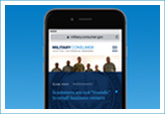Education and policy work complement enforcement in promoting competition and protecting consumers. The FTC helps businesses understand their rights and legal responsibilities, and alerts consumers about how to avoid fraud and other consumer-related problems. The FTC's consumer and business education materials are free and in the public domain. Thousands of organizations share them with their communities and business networks.
Introduction
In 2016, the agency published 31 blog posts through its Competition Matters blog. Popular topics included partial interest acquisitions, trends in reverse payment agreements between branded and generic firms, merger remedies, and premerger notification requirements for foreign entities. The FTC also joined with the Department of Justice to publish guidance for human resource professionals to explain how the antitrust laws apply to job markets. The guidance makes clear that all workers are entitled to the benefit of competition for their services, and that companies should avoid reaching agreements with competing employers that would fix wages or other terms of employment, or prevent them from competing for workers.
In 2016, the Bureau of Consumer Protection published 199 blog posts for consumers in English, 141 blog posts for consumers in Spanish, and 141 blog posts for businesspeople and attorneys. The most-read blog posts were about scammers pushing people to pay with iTunes gift cards, scammers faking caller ID information, the FTC’s settlement with VW, and IRS imposter scams. Nearly 210,000 people subscribe to the English and Spanish consumer blogs and almost 59,000 subscribe to the business blog. In 2016, consumers and businesspeople ordered more than 15 million print publications and viewed 58 million pages of information online.
Military
 This year, the FTC unveiled a mobile-friendly financial readiness tool at Military.Consumer.gov to help members of the military community navigate personal financial decisions in light of the unique challenges they face, such as frequent relocations and deployment. The site includes a new toolkit that provides personal financial managers, counselors, command, and others in the military community practical financial tips they can share with servicemembers. The toolkit also includes slides and talking points to use in programming or counseling for servicemembers and military families. The toolkit resources are in the public domain so individuals and organizations can share them with friends, family, colleagues, and customers, or use the information in newsletters or on social media sites.
This year, the FTC unveiled a mobile-friendly financial readiness tool at Military.Consumer.gov to help members of the military community navigate personal financial decisions in light of the unique challenges they face, such as frequent relocations and deployment. The site includes a new toolkit that provides personal financial managers, counselors, command, and others in the military community practical financial tips they can share with servicemembers. The toolkit also includes slides and talking points to use in programming or counseling for servicemembers and military families. The toolkit resources are in the public domain so individuals and organizations can share them with friends, family, colleagues, and customers, or use the information in newsletters or on social media sites.
The FTC also released a new video that tells the first-person story of a veteran’s debt collection experience — and the legal assistance that helped him recover — and continued hosting Twitter chats and giving presentations to people working with servicemembers and veterans.
IdentityTheft.gov
 For the first time, identity theft victims can now go online and get a free, personalized identity theft recovery plan as a result of significant enhancements to the FTC’s IdentityTheft.gov website. The new one-stop website is integrated with the FTC’s consumer complaint system, allowing consumers who are victims of identity theft to rapidly file a complaint with the FTC and then get a personalized guide to recovery that helps streamline many of the steps involved.
For the first time, identity theft victims can now go online and get a free, personalized identity theft recovery plan as a result of significant enhancements to the FTC’s IdentityTheft.gov website. The new one-stop website is integrated with the FTC’s consumer complaint system, allowing consumers who are victims of identity theft to rapidly file a complaint with the FTC and then get a personalized guide to recovery that helps streamline many of the steps involved.
Nearly 400,000 people used IdentityTheft.gov to report the crime in its first 11 months of operation. IdentityTheft.gov received the 2016 “Impacter Dynamite” Igniting Innovation Award from the American Council for Technology and Industry Advisory Council, and the 2016 Grand ClearMark Award from the Center for Plain Language.
The FTC also released two new videos. What To Do After a Data Breach shows consumers what they can do if they get a notice saying their personal information was exposed in a data breach. IdentityTheft.gov Helps You Report and Recover from Identity Theft helps consumers whose personal information has been used by someone else — to open new accounts, make purchases, or get benefits — to report it at IdentityTheft.gov and get a free personal recovery plan. The agency also created new and revised publications that covered topics including identity theft, data breaches, identity theft affecting military personnel and families, and child identity theft. All of these publications are available in bulk, free of charge, at FTC.gov/bulkorder.
Imposters
 Imposter scams are one of the most common categories of consumer complaints received by the FTC, so education and outreach on imposters continues to be a priority for the agency. Education efforts this year included the creation of ftc.gov/imposters, where consumers can find articles and new videos in English and Spanish on spotting and avoiding four types of common imposter scams: IRS imposters, romance scammers, tech support schemers, and family emergency scammers. The FTC also published 22 blogs on imposter scams, and added new imposter scam articles to its Pass It On campaign, which is tailored to people age 65+ and provides information about fraud and encourages readers to share the information with a friend.
Imposter scams are one of the most common categories of consumer complaints received by the FTC, so education and outreach on imposters continues to be a priority for the agency. Education efforts this year included the creation of ftc.gov/imposters, where consumers can find articles and new videos in English and Spanish on spotting and avoiding four types of common imposter scams: IRS imposters, romance scammers, tech support schemers, and family emergency scammers. The FTC also published 22 blogs on imposter scams, and added new imposter scam articles to its Pass It On campaign, which is tailored to people age 65+ and provides information about fraud and encourages readers to share the information with a friend.
Business Outreach
The FTC engages in extensive business and consumer education on data security to help businesses protect the data in their care, and understand what practices may run afoul of the FTC Act. In 2016, the FTC filled orders for 478,300 free printed publications for businesses on data security. The agency provides general business education about security issues, as well as specific guidance on emerging threats, such as ransomware.
The FTC also offers user-friendly guidance to help companies of all sizes improve their data security practices and comply with the FTC Act. For example, in November the FTC released an update to Protecting Personal Information: A Guide for Business. The FTC first published this guide in 2007, and has updated it periodically ever since. In the fall, the FTC released Data Breach Response: A Guide for Business, which outlines steps businesses should follow when they experience a data breach. The Guide, and a related video, include descriptions of immediate steps companies should take, such as taking breached systems offline, securing any physical areas potentially related to the breach, and notifying consumers. The Guide includes a model data breach notification letter businesses can use to get started.
In 2016, the FTC, NIST, and the SBA offered a series of six webinars on small business cybersecurity, reaching thousands of small businesses across the country. The webinars discussed the Start with Security principles for small businesses and covered “10 cyber mistakes you can’t afford to make.” In conjunction with the National Cyber Security Alliance and the Council of Better Business Bureaus, the FTC participated in at least nine cybersecurity events for small businesses across the country, including in Nebraska, North Carolina, Colorado, California, Michigan, and Virginia. In addition, the FTC conducted webinars and participated in events sponsored by other organizations, including associations for advertisers and retail leaders and the ABA.
